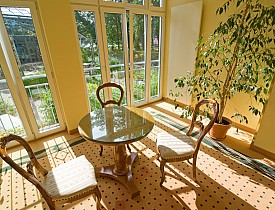Energy Efficient Window Frames
 Old, drafty windows can cause up to 50 percent of heat loss in the winter, and at least as much heat gain in the summer. Most homeowners have heard about double- and triple-pane windows, and energy-efficient glass.
Old, drafty windows can cause up to 50 percent of heat loss in the winter, and at least as much heat gain in the summer. Most homeowners have heard about double- and triple-pane windows, and energy-efficient glass.
However, energy efficiency for windows doesn't stop with the glass. There are many considerations for maximizing the efficiency of window frames, too. Look at the materials, style, shape and installation of any window.
How the Style of Window Frame Effects Efficiency
Along with a U-factor for overall energy efficiency, window companies should also list the air leakage (AL) value on each model. The AL number rates the amount of air that passes through the window frame. It is typically measured in cubic feet per minute per square foot of frame area. Look for the lowest AL. Highly efficient windows have values as low as 0.01.
The AL varies widely according to the window style. Fixed non-opening windows allow very little air leakage. They also don't allow much ventilation, and should not be the only windows in a room. Hinged windows that swing open either vertically or horizontally are the next most efficient option. They provide a tight seal when closed. Sliding and double-hung windows are the least efficient style because they do not create a tight seal.
How Window Coverings Effect Efficiency
Also consider window coverings when choosing a shape and style of window. Two of the most efficient coverings are shades and awnings, but they only work with the right windows. Awnings need to be carefully designed alongside windows to block summer heat but maximize winter sun. Blinds and shades should be mounted close to the glass and fit snugly in the window frame to block light and insulate against extreme outside temperatures. Similarly, curtains should cover the whole window and be close to the glass.
Window Materials Matter
Window frame materials differ in both insulation and durability:
- Fiberglass and vinyl frames are the best insulators.
- Wood is a close second. Look for composite wood frames. They are easier to maintain and more durable because they do not expand and contract with weather shifts.
- Aluminum and other metals are poor insulators. Even with a "thermal break," metal frames are not a great choice.
Installation of Energy-Efficient Windows
Only professionals or very handy, experienced homeowners should install windows. A poorly hung window can be very inefficient. Here are some tips:
- Make sure the windows are squarely installed to prevent air gaps.
- Spray Great Stuff or other foam insulation in the gaps between the wall and the window frame.
- Caulk all the way around the inside and outside of each window.
An energy auditor can measure the leakage around windows. A blower door test will show if air is seeping in around the window frame. If the windows are well-sealed and the home is fairly airtight, be sure fans and ducts are working properly. Otherwise, you may seal in indoor air pollutants.
Window frames can make a major difference in overall home energy efficiency. Carefully consider the style, material, and installation before replacing windows.
Looking for a Pro? Call us (866) 441-6648

Electrical Average Costs
Electricians Experiences

Yard Cleanup By A Local Landscaper Who Cares About Customers

Concrete Patio Is The Finishing Touch For An Artist's Studio



